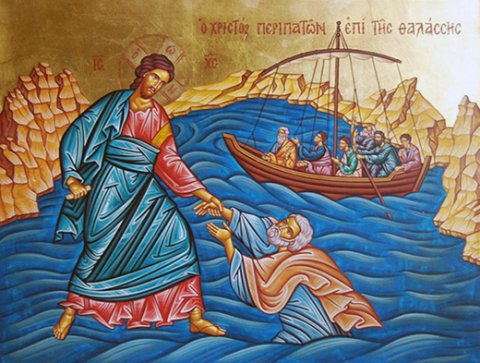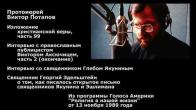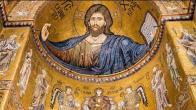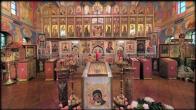You are here
Walking on the Water: Orthodox Homily for the Ninth Sunday After Pentecost

Our family visited the Grand Canyon a few years ago. It is magnificent and awe-inspiring, but when hiking a trail or standing on an overlook, I recall that you have to pay careful attention because you are often just a few feet away from a very steep drop-off. Unfortunately, people have fallen to their deaths in the canyon simply because they didn’t pay attention to what they were doing.
St. Peter made a similar error. As he walked on the water with Jesus Christ, Peter let himself be distracted by the wind and the waves of a stormy sea. Instead of focusing his attention and trust in the Lord Who miraculously enabled him to walk on the water in the first place, Peter let doubt and fear fill his mind. So he began to sink; but when he called out in terror for help, the Lord reached out to Peter and saved him from drowning.
The story is even more profound when we remember that Peter had asked Christ to let him walk on the water. Peter actually tested Him, “Lord, if it is You, command me to come to You on the water.” As was often the case, Peter spoke before he thought, for he was the one who would be put to the test, the test to see if he really had faith; and he fell short.
I imagine that we can all understand Peter’s situation. We may think that we have a lot of faith and even put ourselves in situations where we know we will be tested, but then we let temptations, fears, and our passions take over. We pay more attention to the dangers that threaten us than to the Lord Who gave us life in the first place and continues to enable us to walk by faith even through the most difficult challenges that the world presents. And when we do so, we sink like a stone thrown into the sea or a careless tourist who falls into the Grand Canyon.
For as St. Paul wrote to the Corinthians, our one true foundation in life is in the Son of God. Our entire life is built on Him, the One by Whom all things were made, the One Who became the second Adam to heal our corrupt humanity, the One who conquered death in His third-day resurrection, the One Who has brought us into the eternal life of the Holy Trinity.
When we turn away from Him, we turn away from our true selves. We cut ourselves off from the truth, reality, and power that are necessary to sustain a life fitting for those created in the image and likeness of God. That’s why Peter started to descend to the deep when he gave more attention to his fears than to trust in the Lord. And it’s why we all experience the weakness of slavery to our habitual sins, our passions that seem almost second nature to us. We may believe with our hearts that Christ is the Savior, but our faith shows its weakness when we are confronted with a difficult challenge, when the waves seem so big and the winds seem so strong: and we feel like someone who all of a sudden realizes that he’s trying to walk on the water in the middle of a storm.
Yes, fear, panic, and anxiety will likely then seem more real to us in that moment than will faith, hope, and love. The key question, however, is what do we do then? For we have freedom, we are God’s fellow workers and He never forces us to love and serve Him. We may give in to our temptations and allow our lives to be controlled by our self-centered desires and fears. We may live as though there is no God, as if it’s simply up to us to figure out how to cope as best we can with whatever happens to us. That may sound noble, but it’s still the path to continued slavery to sin and to the grave. For even our best efforts can’t enable us to walk on the water, much less conquer death.
St. Peter shows us a better way of responding to the sudden awareness that we are sinking. He simply calls out, probably at the top of his lungs, “Lord, save me!” This is surely a genuine acknowledgement that he knows his life is collapsing under its own weight, that on his own he’s headed to the bottom of the sea. In crying out for Christ’s help, Peter shows that he does have some level of faith, but it’s not the strength of his faith that saves him. Instead, it’s the mercy of the Lord.
And even though none of us walks on water, we all stand in constant need of the mercy of Jesus Christ. That’s why we sing “Lord, have mercy” so many times in our services. It’s why the Jesus Prayer, “Lord Jesus Christ, Son of God, have mercy on me, a sinner” is at the heart of spiritual vision. We focus on the Lord’s mercy so much because, like Peter, we are constantly tempted to turn our attention elsewhere, to think that what is really important, necessary, and urgent in life is something else of our own creation.
Of course, we must give attention to our work, our education, our family, our friends, and many other significant things in the course of a day. But these objects of our attention don’t have to distract us from the Lord. In our daily prayers, we should ask for God’s mercy upon our loved ones and in our daily responsibilities and undertakings. Whenever we are tempted to sinful words, deeds, or thoughts, we may call upon the Lord’s aid silently. And we can do many things in life quite well while offering short prayers, such as the Jesus Prayer, whether spoken aloud or not.
Now let’s be honest, it takes effort to guard our thoughts and to pray from the heart when we are tempted. It’s usually much easier for us simply to embrace anger, pride, lust, fear, despair, and hatred than it is for us to reject them. That’s again why our epistle passage today refers to us as fellow workers with God. Effort is required and it’s not easy. But the more we struggle and perhaps fail, the greater awareness we will have that our situation is like that of St. Peter. Apart from the mercy of Christ, we will sink and drown. Apart from Him, we are like a building without a foundation that will collapse under its own weight.
And as St. Paul wrote, “Do you not know that you are the temple of God and that the Spirit of God dwells in you?” A temple must be holy and dedicated to God. For us to be a temple requires vigilance and perseverance to ground our lives in the mercy of Christ, for we are so often tempted to worship the false gods of our own devising. All the more is the reason is to maintain a daily rule of prayer and to pray the Jesus Prayer as much as we can.
You see, the more we turn our attention to Christ and His salvation, the better we will be able to respond to Him with faith, to walk with Him on the water through the storms of our own lives. The more mindful we are, the closer watch we will keep on our thoughts, the better able we will be to reject the lies that we so often tell ourselves—and instead to open our hearts to the mercy of the One who is our foundation, our Savior, and the victor over sin and death. Apart from Christ, we will sink like a stone. But in Him, we become fellow workers with God for our salvation. Let us keep our eyes and our hearts centered on Christ, for He is our only true foundation.
Relics in cathedral - monthly calendar
| S | M | T | W | T | F | S |
|---|---|---|---|---|---|---|
|
|
|
|
1
|
2
|
3
|
4
|
|
5
|
6
|
7
|
8
|
9
|
10
|
11
|
|
12
|
13
|
14
|
15
|
16
|
17
|
18
|
|
19
|
20
|
21
|
22
|
23
|
24
|
25
|
|
26
|
27
|
28
|
29
|
30
|
31
|
|
PARISH LIFE
Address of our Cathedral
While all the materials on this site are copyrighted, you may use them freely as long as you treat them
with respect and provide attribution on the Russian Orthodox Cathedral of St.John the Baptist of Washington DC.









